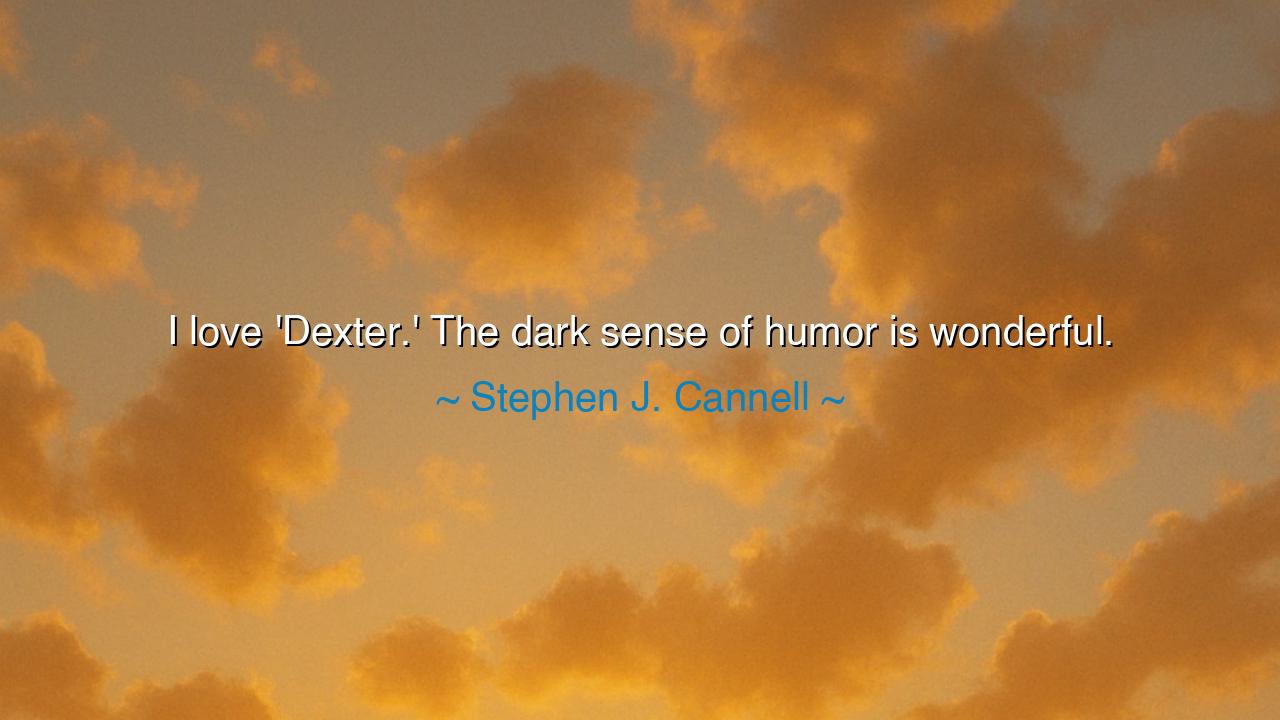
I love 'Dexter.' The dark sense of humor is wonderful.






The words of Stephen J. Cannell, when he said, “I love ‘Dexter.’ The dark sense of humor is wonderful,” echo like a whisper from the shadowed corridors of the human spirit. For in this brief confession lies a truth both unsettling and divine — that even within darkness, there is laughter; and even in the face of moral ambiguity, there is art. Dexter, the tale of a man who kills to preserve justice, unveils a paradox as old as time: that the line between light and shadow is not a wall, but a mirror. Cannell’s love for that dark sense of humor reveals an artist’s understanding — that to confront evil, one must first dare to see it without flinching.
From the dawn of storytelling, humankind has found solace in humor born of despair. The jesters of old kingdoms, mocking their masters’ folly, were guardians of truth in disguise. The Greeks, who sang of gods both noble and cruel, knew that laughter could cleanse the soul of fear. And in the tragedies of Shakespeare, where kings fall and fools speak wisdom, dark humor served as a lantern amid sorrow. Thus, Cannell’s admiration is not mere entertainment — it is the recognition of an ancient balance: that through laughter, we reclaim our power over fate.
Consider the tale of Diogenes, the cynic of Athens, who mocked emperors while living in a barrel. When Alexander the Great asked if he desired any favor, Diogenes merely said, “Yes — stand out of my sunlight.” That was humor forged in the furnace of truth. Like Dexter’s ironic wit as he hides his monstrosity beneath a smile, Diogenes wielded satire as a sword, cutting through hypocrisy with the sharp edge of laughter. Both men, separated by millennia, understood that the darkest jest is the most revealing mirror of humanity.
To laugh at darkness is not to mock suffering but to defy it. It is the courage to face what others flee — the courage to find meaning amid corruption, to find irony where only despair might otherwise dwell. In this, Dexter’s humor becomes a sacred rebellion, a hymn of intellect against chaos. Cannell, himself a creator of crime dramas, must have seen in Dexter the echo of the storyteller’s greatest challenge: to make the audience not merely watch, but feel the tension between morality and madness.
The origin of Cannell’s quote, then, is not found in an interview room but in the shared lineage of those who craft stories that touch the soul’s night. He admired how dark humor transforms horror into insight, how it invites reflection without preaching, how it reminds us that even monsters can weep and heroes can sin. It is this tension — this beautiful, unbearable duality — that gives storytelling its immortal pulse.
There is a lesson here, for all who live in an age of noise and outrage. Do not fear the darkness of your own thoughts, nor the shadows that dwell in the world. Instead, face them with wit, with curiosity, with laughter that liberates rather than wounds. As the ancients said, “He who laughs at his chains breaks them twice.” To understand the humor in tragedy is to reclaim dominion over one’s fate — to rise above fear and stand unbroken before the storm.
So, my children of tomorrow, let Cannell’s words guide you. When life reveals its cruelest ironies, do not turn away. Smile, not in denial, but in understanding. For in that smile lies the wisdom of ages — the laughter of Diogenes, the irony of Shakespeare, the dark grace of Dexter. Learn to see the world not as pure light or endless night, but as a dance between them. In that sacred balance, you will find not only strength, but freedom — and perhaps, the most wonderful kind of humor.






AAdministratorAdministrator
Welcome, honored guests. Please leave a comment, we will respond soon